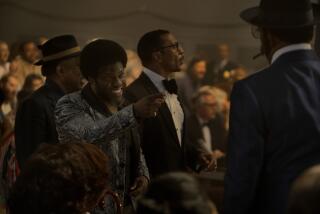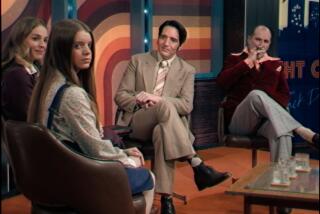MOVIE REVIEW : Murderous Fun in the ‘Midnight Run’
Robert De Niro and Charles Grodin, stars of the expert, sometimes murderously funny chase comedy “Midnight Run” (citywide), aren’t the kind of actors you’d normally expect to see together. De Niro has a genius for full-blooded psychology and emotionalism; Grodin is a comic specialist in white-collar neurotics who tends to dance over his material lightly, ironically.
But in movies, as in life, opposites sometimes attract. In “Midnight Run,” De Niro and Grodin play characters as antagonistic as their acting styles: a kind of crime movie Odd Couple, a Laurel and Hardy on the run.
They’re cast as hard-case bounty hunter Jack Walsh (De Niro) and soft-shelled embezzler Jonathan Mardukas (Grodin), whom Walsh is bringing back to a sleazy, double-dealing Los Angeles bail bondsman, against almost Sisyphean odds.
Most of “Midnight Run” is set on a wild cross-country chase from New York to Los Angeles, with tough Walsh and beleaguered Mardukas trying to elude both the Mafia and the FBI--and, in the midst of chaos and jeopardy, learning to respect and even love each other.
It’s not a very original idea or a very inventive screenplay: one more buddy-buddy crime comedy, with a tightly suppressed homo-erotic undercurrent, loaded with car crashes, gunfights and exploding helicopters.
But who said movies always have to be original? This one is redeemed by execution and brilliant talent: De Niro, Grodin, director Martin Brest, composer Danny Elfman, most of the cast and technicians. It’s one case where the flaws of the script--Walsh’s incredibly rapid location of a man on the lam from both the mob and the government, the relative absence of women, the tight but predictable form--don’t really matter. There’s some soul behind the explosions, a heartbeat below the slick carnage.
In the film, Walsh and Mardukas, hunter and hunted, almost seem to be inhabiting separate planets--this charmingly naive accountant who embezzled millions of dollars from the mob and donated most of it to charity, and the embittered ex-cop, who initially despises him.
Walsh and Mardukas seem unlike in almost every possible way: street-wise versus college-smooth, rough versus genteel, junk food and cigarettes versus health food, loner versus family man. Walsh is stoical, the Duke a kvetch. Walsh is lean, mean, lower middle class; the Duke a bourgeois with smooth-skinned ideals and baby-fat rhetoric.
Brest and screenwriter George Gallo--who also wrote Brian De Palma’s nightmare Mafioso comedy “Wise Guys”--give these two a unifying trait and grudge. They’re both idealists, and both have been wronged by Mafia boss Jimmy Serrano, symbol of society’s corrupt center. That idealism draws them together. The movie is really about two inwardly cockeyed Galahads united against a stupidly violent world, riddled with greed, mendacity and hypocrisy.
Still, it’s essentially a comic vision. There’s one solidly evil character: Serrano, an ice-cold killer of a Mafia boss, whom ex-Chicago cop Dennis Farina plays with a frighteningly convincing brutality. Everyone else--except FBI agent Yaphet Kotto--is played largely for laughs. They’re mostly clowns, Damon Runyonesque oddballs: the sleazy bail bondsman (Joe Pantoliano) and his treacherous clerk, Serrano’s wheedling shyster (Philip Baker Hall) and two clumsy near-moronic hit men (Richard Foronjy and Robert Miranda).
Brest’s touch with “Beverly Hills Cop” humanized it; he got those idiosyncratic, offbeat little moments that can make a movie pop to life. The great scenes in “Midnight Run” aren’t gunfights or crashes, but moments of interplay or connection between the leads.
There isn’t a single performance in “Midnight Run” that doesn’t have a pulse, that doesn’t show the actors at their best or near-best, especially De Niro.
When all good actors die and go to heaven, do they get to be Robert De Niro? In the last decade he’s become a real symbol of excellence, somewhat as Brando was in his day, or Spencer Tracy in his. And De Niro deserves it; he’s a genius at specifics.
Here he has the jaded wariness and quick reflexes of an ex-cop, the swallowed pain of a longtime divorcee: He lets you feel everything as he runs a counterpoint between Walsh’s brusque exterior and his softer innards.
If “Midnight Run” (MPAA-rated R for language and violence) doesn’t really offer De Niro a great role, it does give him a great star showcase. And if Brest’s direction doesn’t seem to have advanced far enough past “B. H. Cop,” it’s still good to see his special balance of nimble wit, humanity and excitement back on the screen--and to see an action movie where the people clash and crash more memorably than the cars.
‘MIDNIGHT RUN’
A Universal Pictures release. Producer-director Martin Brest. Script George Gallo. Executive producer William S. Gilmore. Camera Donald Thorin. Editors Billy Weber, Chris Lebenzon, Michael Tronick. Music Danny Elfman. Production design Angelo Graham. With Robert De Niro, Charles Grodin, Yaphet Kotto, John Ashton, Philip Baker Hall, Dennis Farina, Joe Pantoliano.
Running time: 2 hours, 2 minutes.
MPAA rating: R (under 17 requires an accompanying parent or adult guardian).
More to Read
Only good movies
Get the Indie Focus newsletter, Mark Olsen's weekly guide to the world of cinema.
You may occasionally receive promotional content from the Los Angeles Times.










